Having survived four March winter storms and a few power outages, the Swarthmore College Music and Dance Department is now ready to host its series of spring concerts, featuring students from a variety of classes and music and dance groups. One of these is the Wind Ensemble Concert, featuring over thirty members from the student body, faculty, and Swarthmore community.
Wind Ensemble is one of the largest music courses at Swarthmore, with over 30 members this semester. It is also one of the oldest, ongoing since the 1980s. Andrew Hauze, a Swarthmore professor trained as a conductor, pianist, and organist, has taught the class every semester for the past seven years.
“The biggest challenge from semester to semester is figuring out who is playing, what their level is, and finding music that everyone can play together,” says Hauze. “…I love that it brings students together from all across campus. I get to hear about what they’re doing in their courses, and meet students from all departments.”
The Wind Ensemble is open to students from all class years and majors who play wind, brass, or percussion instruments. As a Tri-Co class, the Ensemble often has at least a few students from Bryn Mawr and Haverford, in addition to faculty and members from the local community. As Hauze explains, “if we have room, we open the Ensemble to community members, especially those who play instruments we don’t have in that year’s ensemble. It’s really nice – [students and community members] really get to know each other and many of the faculty and community members keep coming year after year, for over a decade, so there’s this intergenerational dynamic.”
This semester’s Wind Ensemble features two faculty members, Gilbert Rose (Classics) on the trumpet and Carr Everbach (Engineering) on the trombone, in addition to four community members. The Ensemble features a variety of instruments and musicians, ranging from six clarinetists and flutists to a pianist, and one player of the less-known euphonium (a baritone horn). Regarding Wind Ensembles in general, Professor Hauze notes, “one of the strange things about Wind Ensembles as a group is that it only began to coalesce in the 20th century. So if we want to play older music it needs to be arrangements not originally intended for this group. I like to get a mix of pieces originally written for these instruments and pieces that have been arranged. The Ensemble always plays together, for every piece.”
Saturday’s concert will feature seven pieces, divided into two sections, mainly religious and spiritual works. To honor the centennial of the birth of Leonard Bernstein, one of the most famous American composers in musicalhistory, the Ensemble will perform his “Profanation,” a complex piece whose meter changes with almost every measure.
Hauze’s personal favorite in the first section is “O God Unseen,” by Philadelphia-born composer Vincent Persichetti. This will be Hauze’s first time conducting the piece.
“[Persichetti] was this very famous composer, with a lot of weight in the musical community. But at the same time he was interested in writing for ordinary people, so a lot of his wind music is in that vein,” explains Hauze. “But at the same time he is very serious, this is a brooding and haunting piece. The musical language is pretty complex, but playable by a college group. It’s been very challenging but super fun to learn!”
The second half of the concert will be more lighthearted, and focused on storytelling. Hauze is especially fond of the Overture of 1930s Broadway musical Of Thee I Sing, composed by George Gershwin. “The Gershwin one is very close to my heart, because I think he is really fantastic but not as well known today. It’s also an arrangement I made 5 years ago, and because it is an overture it has fragments of music from all over the show, but they were blended in a way that’s really ingenious,” says Hauze.
The Wind Ensemble Concert is held Saturday, April 14, at 8pm in Lang Concert Hall. Students and community members are all welcome to attend.
Emilie Hautemont ’20
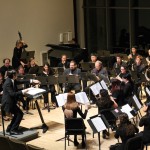


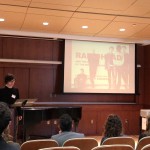
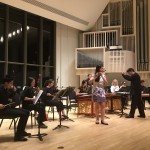
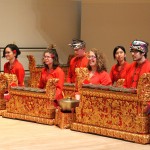

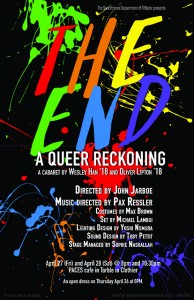 THE APOCALYPSE IS NIGH.
THE APOCALYPSE IS NIGH. 